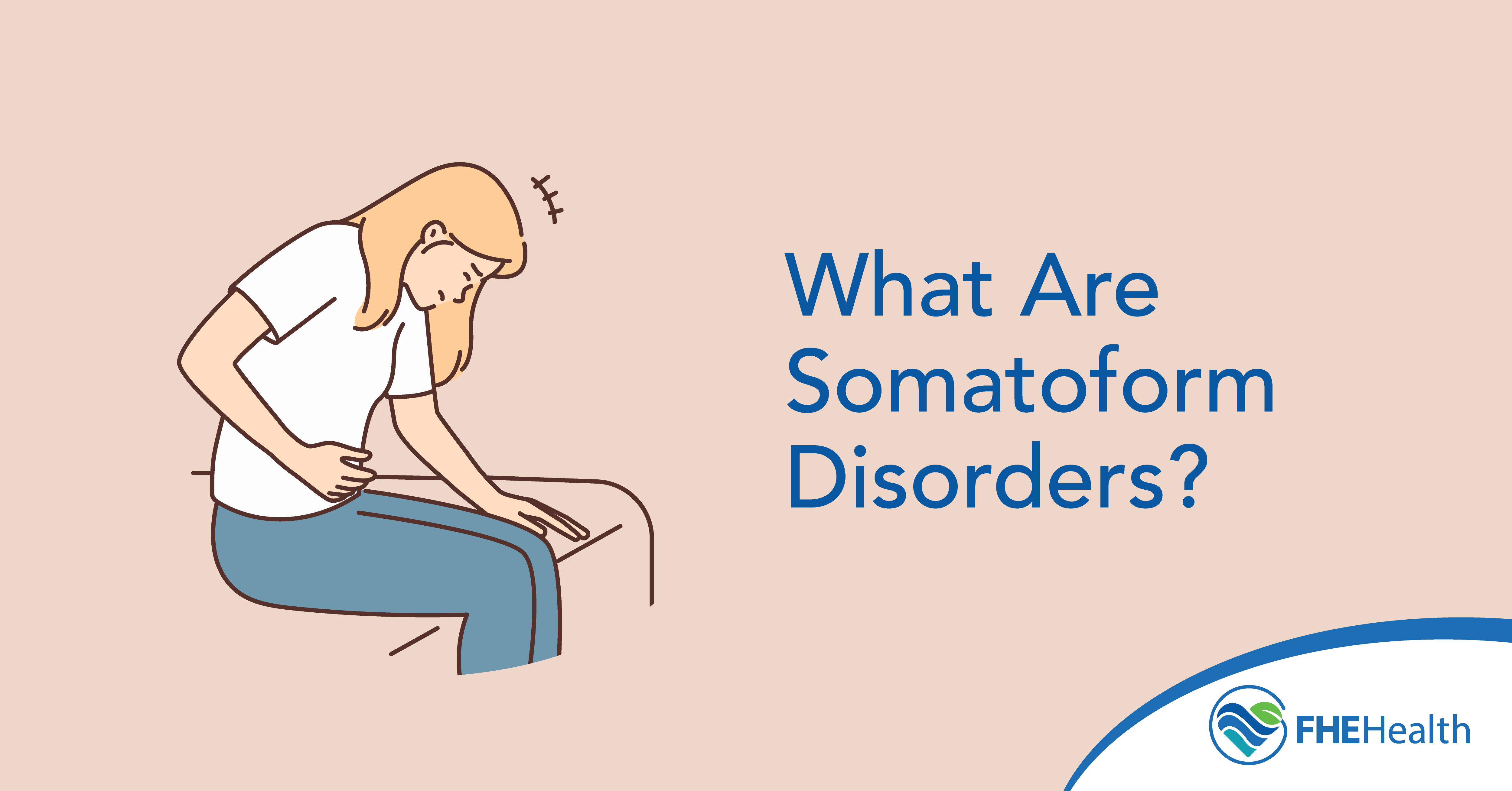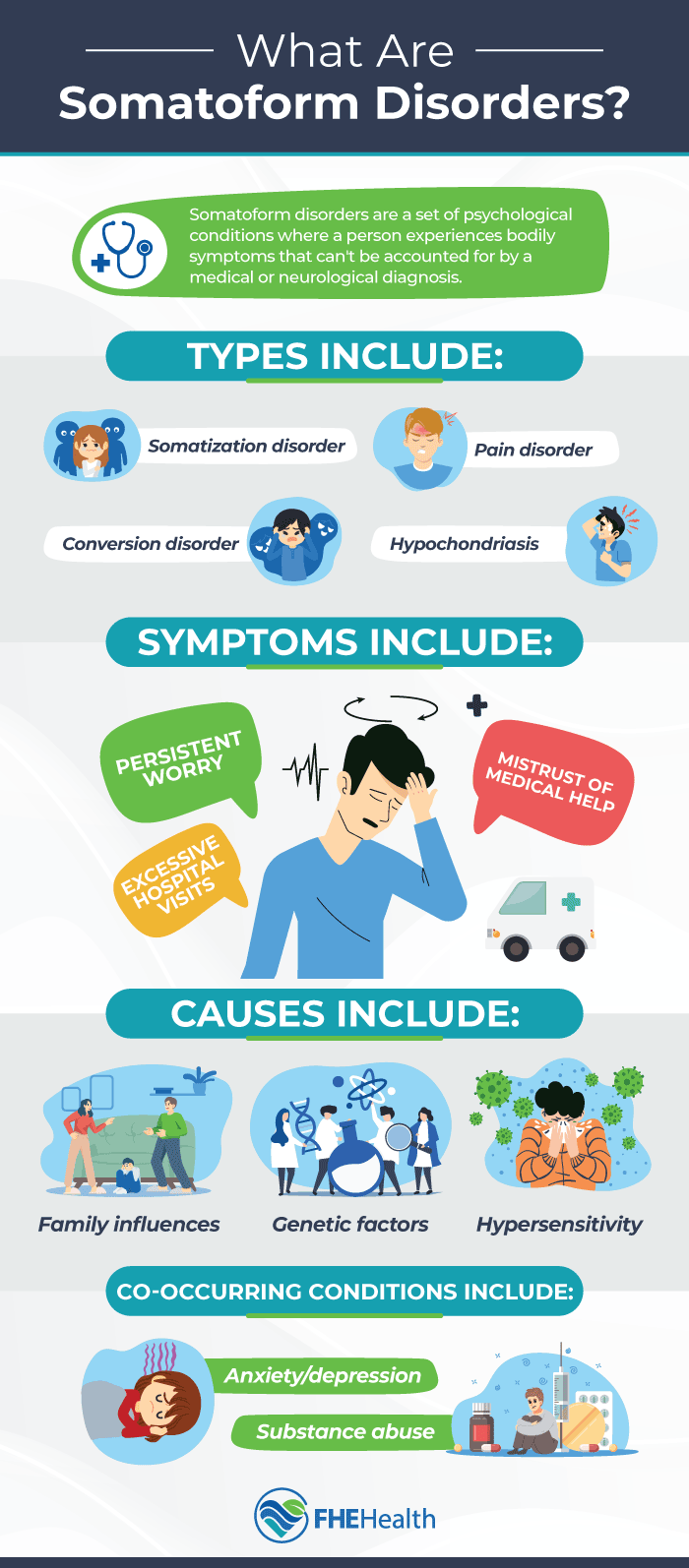
Mysterious ailments happen to most people from time to time. You might experience a backache of unknown origin that eventually resolves itself, for example, or have intermittent allergy symptoms you can’t tie back to a specific allergen. Stomach issues can be notoriously difficult to pin down, and many people have experienced abdominal distress that eventually goes away without them ever discovering the exact cause of the problem. However, if you regularly experience physical symptoms that can’t be explained by known or discoverable health conditions, you may have somatic symptom disorder (SSD).
Understanding Somatic Symptom Disorders
Somatoform disorders, which are also known as somatic symptom disorders, are mental health conditions. They result in people experiencing physical symptoms, including pain or fatigue, that aren’t connected to an identifiable physical condition.
Someone with SSD may suffer from these physical symptoms even when medical tests such as labs and exams don’t indicate a clear cause. Somatic symptom disorder impacts between 5% and 7% of the population, and it’s more likely to impact females than males. Some chronic conditions, such as fibromyalgia, can increase a person’s risk of dealing with somatoform disorders.
Common Symptoms and How They Manifest
SSD requires someone to experience one or more physical symptoms over an extended period of time that aren’t related to another health condition. Symptoms of somatization can include:
- Persistent physical symptoms that aren’t otherwise explained. Common culprits are dizziness, fatigue, stomach or abdominal pain, headaches, sore muscles, and joint pain. However, other physical symptoms might indicate a somatoform disorder.
- Ongoing and excessive distress about the body or health. Some types of SSD or related conditions result in anxiety about health or the way the body works, contributing to frequent visits to doctor’s offices, emergency rooms, and other medical facilities. This includes worry that mild symptoms may indicate a serious health condition or anxiety over relatively normal body functions.
- Not accepting health care provider assurances of good health. Someone with SSD may not be able to readily accept a clean bill of health from a physician, as they can’t believe nothing is wrong given their symptoms.
- Negative impact on performance. SSD can lead to negative outcomes at work, in personal relationships, or with personal goals.
Types of Somatoform Disorders
Several other disorders are closely related to SSD or are types of SSD. They include:
- Conversion disorder, or functional neurological symptom disorder. This condition relates specifically to neurological symptoms that don’t seem to have a medical cause. Symptoms might include blindness and hearing issues, tremors, seizures, paralysis, weakness in the limbs, and loss of sensation in parts of the body.
- Illness anxiety disorder. This condition is often referred to as hypochondria. Someone with an illness anxiety disorder is overly concerned with the risks that they might have a serious illness, and they associate minor complaints with serious medical issues. For example, someone with this condition might think having sore abdominal muscles after a workout is a sign of stomach cancer.
- Pain disorder. This condition causes someone to have pain that’s not associated with known medical conditions. The pain may be a somatic symptom related to an underlying mental health condition, such as anxiety or stress.
- Body dysmorphic disorder. Someone with this condition is preoccupied with a perceived body defect to the point that it becomes dangerous or can substantially impact their quality of life. The defect in question may be real, such as a birthmark, or imagined.
It’s also possible to have a diagnosis of somatoform disorder not otherwise specified, which indicates somatization is present but there aren’t enough other factors for a more specific diagnosis.
Potential Causes and Risk Factors Associated With Somatoform Disorders
As with many mental health disorders, the causes of SSD aren’t completely understood. However, risk factors may include:
- Genetics. Some people may have a predisposition to traits that increase the likelihood of developing somatoform disorders, including a high sensitivity to pain or anxiety.
- Personality. People who are especially nervous, anxious, or pessimistic may be more likely to develop SSD, in part because they’re more likely to dwell on risk factors, body symptoms, and potential illnesses.
- Environmental influence. If someone is raised in, lives in, or works in an environment where there’s a constant focus on health, body functions, or physical symptoms, they may have an increased risk of developing SSD.
- Stress. Chaos in day-to-day life and other stressors can increase somatization risks.
- Trauma. Trauma such as neglect or abuse — or a specific traumatic event that creates a PTSD response — can increase the risks of SSD.
- Substance abuse. Somatic symptoms are common among people who struggle with addiction or regularly abuse drugs or alcohol.
How Are Somatoform Disorders Diagnosed and Treated?
Medical professionals are typically involved in diagnosing SSD and related disorders because it’s critical to rule out any physical ailments first. When someone reports physical symptoms of any type, doctors and other clinicians may conduct a physical exam, order labs, and other tests, and ask about medical histories to help them rule out any potential conditions.
Once likely physical conditions are ruled out, providers can consider somatoform disorders, which are defined in the Diagnostic and Statistical Manual of Mental Disorders (DSM). The specific factors that must be present for an SSD diagnosis include:
- Physical symptoms that have persisted over time
- The person dedicating a lot of time, emotion, and energy to the symptoms
- The person experiencing a significant amount of distress or day-to-day dysfunction because of the symptoms or their worry over the symptoms
- The symptoms not being fully explained by existing medical conditions
In some cases, according to the DSM-5, somatic symptom disorder can be diagnosed even when there’s a clinical explanation for some of the symptoms.
Treatment for SSD often focuses on reducing stress and increasing day-to-day functioning rather than medicating and reducing specific symptoms. Healthcare teams may recommend lifestyle changes, particularly around diet, exercise, and stress reduction. Cognitive behavioral therapy and other mental health treatment options can also help individuals identify root causes for anxiety and stress that might be contributing to somatic symptoms.
Connect With Experienced Mental Health Professionals Now
If you’ve been diagnosed with SSD or believe you might be struggling with a somatoform disorder, professional mental health resources can help. Find out more about your options for treatment by reaching out to FHE Health.







